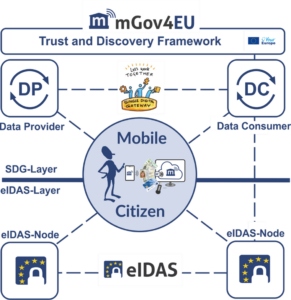With the practical implementation of the “eIDAS regulation”, which has been fully applicable since July 2016, the European Union has made great strides in recent years in successfully simplifying the cross-border online identification process for citizens. In addition, in December 2020 a first part of the “Single Digital Gateway (SDG)” regulation for the establishment of a uniform digital access gate for administration in the EU came into force. After all, there is an unbroken trend towards the mobile and self-determined use of administrative services: Today, citizens expect eGovernment services to always be conveniently usable via smartphone. Against this background, the mGov4EU (“Mobile Cross-Border Government Services for Europe”, https://mGov4.EU) project, funded by the European Union as part of the Horizon 2020 research and innovation program, has recently started to enable mobile cross-border administrative services in Europe. The project is open to further pilot partners and cordially invites you to participate.
The mGov4EU project assembles leading European experts from government, business and science located in Austria, Belgium, Estonia, Germany, and Spain, to enable secure and privacy-friendly mobile government services across Europe. mGov4EU will put the citizen at the center of the considerations and offer them new, secure and privacy-protecting options for managing their identity and personal data – regardless of whether they or the eGovernment service are located in the home country or in another EU Member State.
mGov4EU combines eIDAS with a single digital gateway in a user-centric way
The regulatory framework for this project is provided by Regulation (EU) 2018/1724 on the establishment of a Single Digital Gateway Regulation (SDGR) for the cross-border provision of services together with the eIDAS Regulation (EU) No. 910/2014 for cross-border electronic identification and trust services for electronic transactions in the internal market. The mGov4EU project puts the requirements of self-sovereign and mobile citizens at the center of the considerations and integrates the existing eIDAS ecosystem with the new Single Digital Gateway to create a user-friendly overall system.

Figure 1: The mGov4EU-System at a glance
Within the mGov4EU project the existing and emerging possibilities of the eIDAS and SDG regulation will be used and the principles of “once-only”, “digital-by-default” and “mobile-first” will be implemented in practice. After a user-friendly mobile identification and explicit approval by the user, it will be possible to access data that is already available, so that the time-consuming filling out of complex forms can be dispensed with, as far as possible. Through the consistent use of the technologies available in modern smartphones, the solutions targeted in mGov4EU are not only expected to meet the highest security and data protection requirements, but also offer an excellent user-friendliness. The mGov4EU project aims at providing basic building blocks for secure and mobile eGovernment services that can be used throughout Europe and beyond. These modules will be tested in selected pilot applications in the field of electronic voting, smart mobility and, last but not least, mobile signature, before they will be made available to a broader group of users. In this way, based on the mGov4EU developments, a trustworthy federation of collaborative eGovernment platforms can emerge, which facilitates the joint provision and reuse of available and easy-to-use public services.
The mGov4EU project is carried out by an interdisciplinary team of experts
The mGov4EU project is fully funded by the EU research and innovation program Horizon 2020 with a budget of 3.9 million Euro. The mGov4EU project assembles top-class, internationally experienced, interdisciplinary experts from administration, business and science. In addition to the TECHNIKON Forschungs- und Planungsgesellschaft mbH as coordinator, the Center for Secure Information Technology Austria (A-SIT together with A-SIT Plus GmbH), Danube University Krems, ecsec GmbH, the Fraunhofer-Gesellschaft zur Förderung der angewandten Forschung e.V., go.eIDAS Association, Graz University of Technology, Scytl Election Technologies, TIMELEX and the University of Tartu work on this project.
During the three-year project period, several mGov4EU pilot applications will be designed and implemented in order to validate the solution modules and infrastructure services provided. The pilot applications include electronic voting, smart mobility based on subsidised taxi rides and mobile signature. Interested authorities across Europe are cordially invited to contact the mGov4EU project in order to participate in these pilot applications or to use the innovative technologies in their own applications at an early stage.
